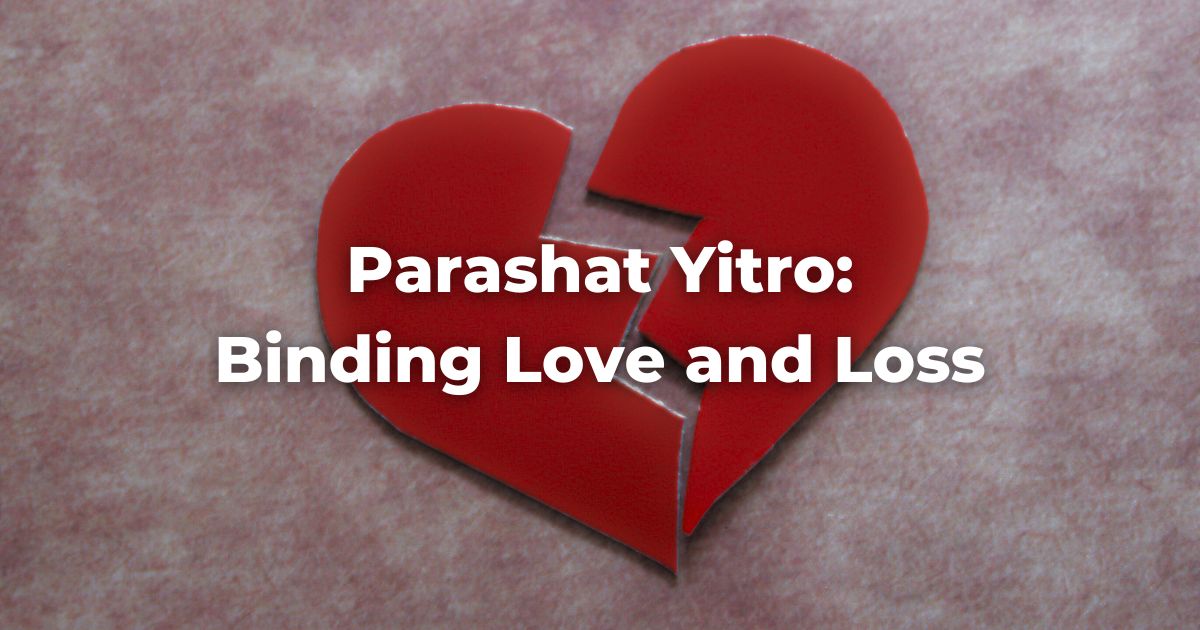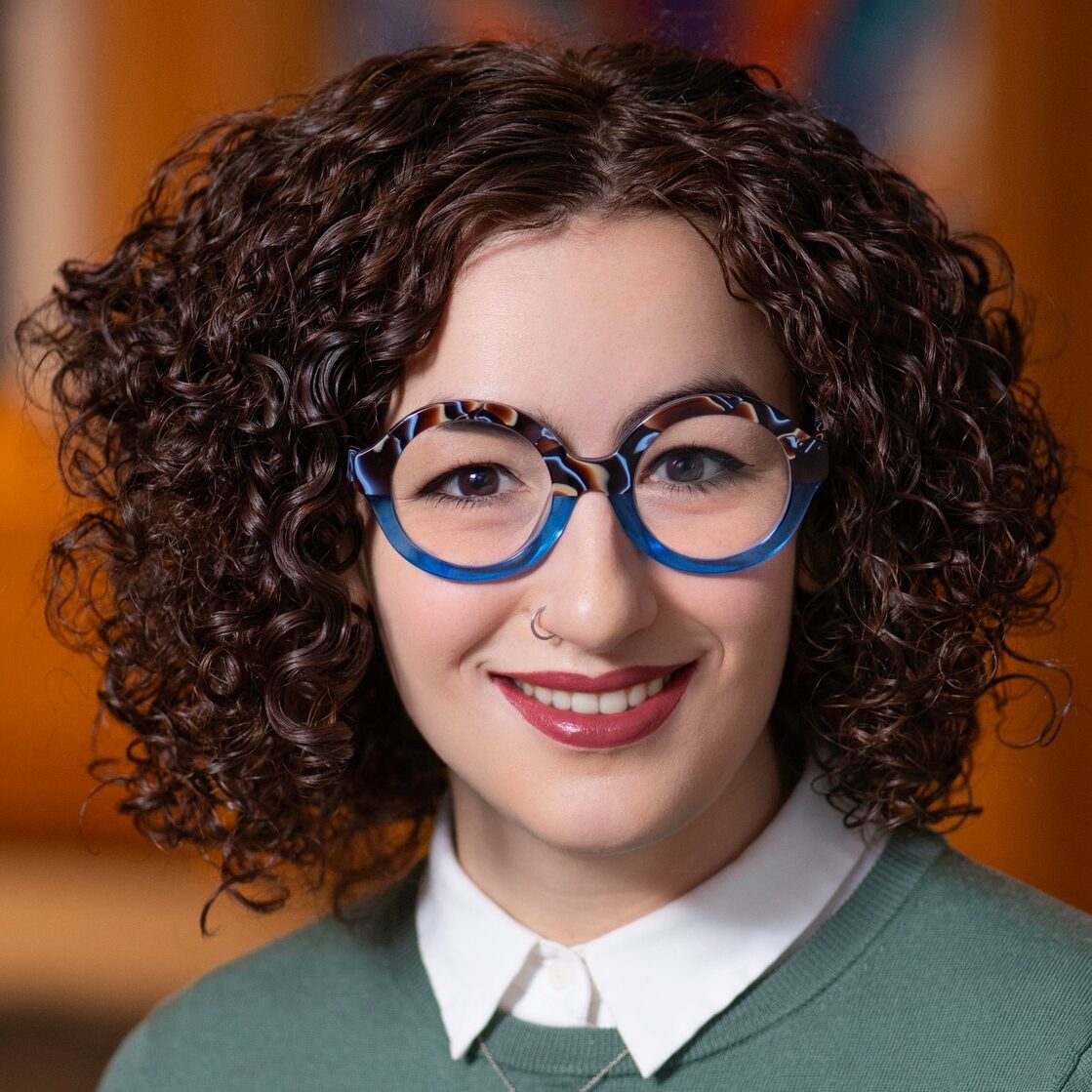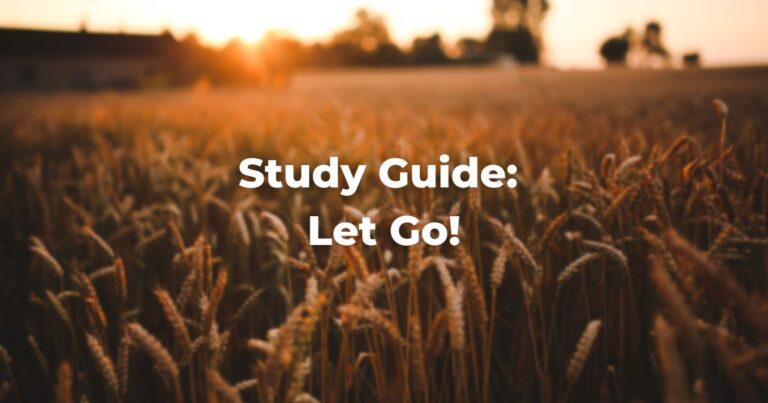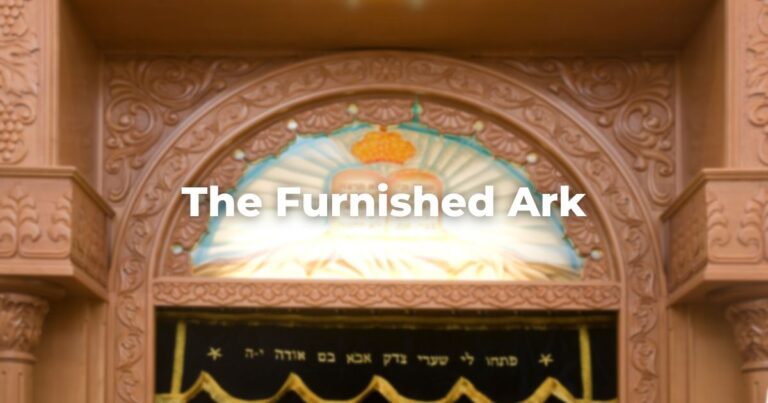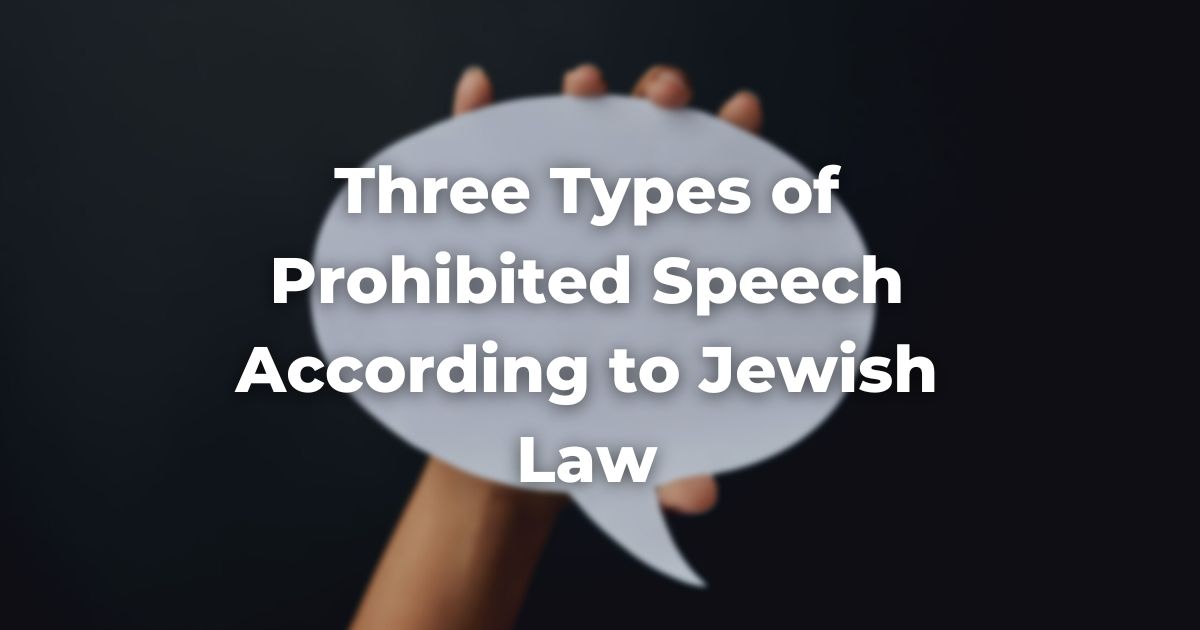Originally given as a senior sermon at JTS.
“Why is the measure of love loss?”
This question opens Jeanette Winterson’s haunting novel Written on the Body. The book is written in the voice of a nameless and non-gendered narrator who falls in love with Louise, a married woman dying of leukemia. Winterson’s narrator’s initial expectation that the experience of human love will follow a pre-established story is challenged by the reality of loving someone so immediately mortal.
How do we love someone or something we know won’t last forever? How do we live a life that honors equally love and pain, darkness and light?
Parashat Yitro tells the story of b’nai Yisrael camping at the base of Mount Sinai, waiting for Moshe to ascend to receive the Ten Commandments from God. The Israelites are subject to what Abraham Maslow called a “Peak Experience,” and now must figure out how to live in a world that has been instantaneously transformed before their eyes. Like Winterson’s love-drunk narrator, they have to write a new story in light of a world that contains both beauty and ugliness.
’’וְכָל־הָעָם֩ רֹאִ֨ים אֶת־הַקּוֹלֹ֜ת וְאֶת־הַלַּפִּידִ֗ם וְאֵת֙ ק֣וֹל הַשֹּׁפָ֔ר וְאֶת־הָהָ֖ר עָשֵׁ֑ן וַיַּ֤רְא הָעָם֙ וַיָּנֻ֔עוּ וַיַּֽעַמְד֖וּ מֵֽרָחֹֽק׃‘‘
“And all of the people saw the voices/witnessed the thunder and the lightning, the blare of the shofar and the smoking mountain. They saw all of this and trembled, and stood far away.”
The Zohar reads: “Those voices were carved upon the darkness, cloud, and the fog, visible as a body is. And they saw whatever it was they saw, and heard what they heard from within the darkness, cloud, and fog.” TorahRefers to the first five books of the Hebrew Bible, the Tanakh, also called the Five Books of Moses, Pentateuch or the Hebrew equivalent, Humash. This is also called the Written Torah. The term may also refer to teachings that expound on Jewish tradition. Read more came into our world not through light and calm but through darkness and disorder; not through pure beauty but through ugly weather.
It is an experience so confounding and inarticulable, it causes trembling and distance, not closeness.
Similarly, the Jewish day begins in darkness at nightfall, not when the sun rises. I feel that this reflects one of the holiest lessons of my life, which is that it is impossible to experience joy without also experiencing sorrow. As author Ross Gay writes in his essay collection Inciting Joy: “What happens if joy is not separate from pain? What if joy and pain are fundamentally tangled up with one another? Or even more to the point, what if joy is not only entangled with pain, or suffering, or sorrow but is also what emerges from how we care for each other through those things? What if joy, instead of refuge or relief from heartbreak, is what effloresces from us as we help each other carry our heartbreaks? Which is to say, what if joy needs sorrow, or what Zadie Smith in her essay ‘Joy’ calls ‘the intolerable,’ for its existence?”
Or as Winterson’s narrator says of their love for the dying Louise: “She opened up the dark places as well as the light. That’s the risk you take.” That is the risk we take, and it’s a risk that B’nai Yisrael took by accepting the Torah.
How, then, do we go on living after such an earth-shattering experience? What do we do with the hole that it carves out in us? What do we do with the spectral haunting it both produces?
I remember in my first year of rabbinical school, learning from Rabbi Jan Urbach that life is like a sine curve, with high peaks and low valleys. If we try to limit the amount of sadness that we feel by cutting off the lowest part of the curve, we’ve immediately lowered the possible height of our joy. Living with the Torah and loving Hashem gives us the ability not just to withstand hardship, but to reshape the very clay of our sorrow into something of beauty and light.
This is very much in line with the writings of Rebbe Nachman, who said “Yet greater still is to gather courage to actually pursue gloom, and to introduce it into the joy, such that the gloom itself turns into joy.” The things in my life of which I am the most proud and that bring me the most joy I found not by ignoring or sidestepping painful experiences, but by fully embracing them and turning them into experiences of stunning beauty and grace.
There is no joy without pain, but that also means that there is no suffering without beauty. People ask me how I can believe in God despite some of the things that I have experienced, but I wonder precisely how one can see sorrow without also seeing God’s love. To tell of God and Torah is to tell of beauty and pain together in one breath.
Twice daily in the blessing before the Sh’ma, we affirm the entrance of Torah into the world as a profound act of God’s love.
This extension of love was not only loud, smoky, and terrifying—not peaceful or quiet—it also models love as something that can bring permanent changes to our world in a dramatic way for which we have no context.
When B’nai Yisrael took in the scene at Mt. Sinai, they had no way of knowing what would come next or exactly how their world would change. Such is the case for many acts of love, which tend not to change us silently or slowly but rather often untidily and all at once.
It was Lemony Snicket who said, “Love can change a person the way a parent can change a baby—awkwardly, and often with a great deal of mess.” Accepting the Torah, like all great experiences of love, means opening oneself up to the possibility of heartbreak and anguish. Winterson’s narrator calls the prospect of loving a mortal person “an expensively ruinous experiment,” which is about as apt a description as any.
So how do we actually go about living a life that equally honors the full spectrum of human life, of the beauty and the horror? How do we live lives that fully honor the experience at Mount Sinai?
This is where mitzvot and law come in. Loving—whether a human or God—is inherently an experience of being bound. It requires tying our fates to that of another, and in that sense restricting our freedom to a degree. However, this needn’t be a bad thing.
The great Indian poet Rabindranath Tagore offers a superb metaphor: “I have on my table a violin string. It is free to move in any direction I like. If I twist one end, it responds; it is free. But it is not free to sing. So I take it and fix it into my violin. I bind it and when it is bound, it is free for the first time to sing.”
Love means being permanently tied to the story of someone else, with no control over what that story will look like.
We are bound to Hashem despite not knowing what God will choose for us, as we and God grow. But perhaps our stories only have meaning when they are bound to that of another, whether a person or God.
’’אָֽנֹכִ֖י֙ ה׳ אֱלֹקֶיךָ אֲשֶׁ֧ר הוֹצֵאתִ֛יךָ מֵאֶ֥רֶץ מִצְרַ֖יִם מִבֵּ֣֥ית עֲבָדִ֑͏ֽים׃‘‘
“I Hashem am your God who brought you out of the land of Egypt, the house of slavery.”
I believe that it is on the very first word of this first of the Ten Commandments—anochi, I—that the rest of the Torah and the world stand. The world permanently changed at the moment that God uttered the word anochi. The Mekhilta deRabbi Yishmael teaches that when God said anochi, the mountains shook and the hills swayed. Everything had to shake and tremble for Torah to come into the world.
The Zohar teaches that anochi is the name of the ShekhinahLiterally translated as “Presence,” while rabbinically, it is a term referring to God’s presence in the world. Its feminine form gave rise to the mystical expression of God’s feminine attributes. Read more, the presence of God. The very presence of God who went down to Egypt in slavery with us and suffered along with us at every junction.
In Shabbat 105a, the TalmudReferring to one of two collections, the Jerusalem and Babylonian Talmuds, edited in the 6th century, that contains hundreds of years of commentary, discussion, and exploration of the ideas in the Mishnah. One could describe it as Mishnah + Gemara = Talmud Read more says the anochi is an acronym: אֲנָא נַפְשִׁי כְּתַבִית יְהַבִית /I have inscribed my soul and given it to you. My soul and my essence I have written and given it to you. Rabba Tamar Elad-Appelbaum, my dear rebbe, teacher, and friend, has a teaching on this concept that truly changed my life. She explains that “the anochi is the story that I bring with me when I experience the law. ‘Do not murder’ has no meaning if I do not say ‘something has happened to me,’ ‘don’t steal’ is meaningless if I don’t share how someone stole something from me.”
By giving the Ten Commandments and especially by uttering the word anochi, Shekhinah told us her story.
She told us she was hurt by B’nei Yisrael’s misdeeds, but instead of leaving us chose to give us the Torah and teach us how to love each other. The Torah is the story of how people hurt God, but it’s also about hope and comfort.
So too when we tell our stories, we are giving our souls to the people we love. We are giving the fullness of our pain and joy and in that gift making beauty from ugliness.
This is exactly how we live the lives that this parsha urges us to: We tell our honest stories and bring other people to redemption through them.
The Rebbe of Radomsk said that when we say anochi, when we acknowledge the fullness of the things that have happened to us, we complete our personal exodus from Egypt. Liberation is never a solo endeavor; our own redemption is deeply tied to that of the people around us. Rabba Tamar teaches that when we say anochi, we are trying to warn people about a danger in the world, but what if we also alert them to the good? Or maybe more precisely, what if we did both? When I say “anochi” or “Me Too” about the bad things that have happened to me, I also teach about the beauty that that pain has brought me.
There is a final peculiarity about the first of the Ten Commandments. The other nine are all obvious practical commandments: Don’t steal, don’t kill.
But how is the statement “anochi Hashem elokecha” a commandment? Many commentators use this to deal with the question of whether or not faith in God is a commandment, but I want to take it in a different direction. Anochi is a commandment, and we fulfill it by teaching others about both the joys and sorrows of the world. We fulfill it by saying “Me Too.” We fulfill it by saying “I have seen God, and she was darkness and she was light.”
Winterson’s narrator never does find an answer for why we measure love by loss, but they do learn one important lesson after Louise dies: “And if anyone had said this was the price I would have agreed to pay it. That surprises me; that with the hurt and the mess comes a shift of recognition. It was worth it. Love is worth it.”
I have never lost without feeling that the love was still worth it. Never have I suffered in a way that I wish I could take back. It was, in the end, worth it. I don’t necessarily know how to tie that in a neat bow, and neither does our narrator. The final line of our book: “I don’t know if this is a happy ending but here we are let loose in open fields.”
I don’t even know what it means for life to have a happy ending–we are all, in the words of Mayim Bialik’s character from the Big Bang Theory “Subject to entropy, decay, and eventual death.” So, I’ve given up searching for that elusive happy ending. What I can do, what we can all do, is to remain open to Torah and love, whatever the cost. On that note I want to conclude with the last paragraph of the poem “When Loves Arrives” by Sarah Kay and Phil Kaye:
When Love Arrives
Maybe Love is only there for a month.
Maybe Love is there for every firework. Every birthday party. Every hospital visit.
Maybe Love stays. Maybe Love can’t. Maybe Love shouldn’t.Love arrives exactly when Love is supposed to and Love leaves exactly when Love must.
When Love arrives, say, “Welcome. Make yourself comfortable.”
If Love leaves, ask her to leave the door open behind her.
Turn off the music. Listen to the quiet.
Whisper, “Thank you for stopping by.”
Author
-

Amalya Volz is a chaplain, spiritual leader and seeker, social justice organizer, and teacher of Jewish texts. She received a BA in Jewish Studies from Oberlin College in 2019. Amalya has held leadership positions in several communities in Ohio and New York, including the Cleveland Partnership Minyan, Oberlin Hillel, the Beis Community, and the Fort Tryon Jewish Center, where she served as the rabbinic intern. She is passionate about writing and her publication credits include Hey Alma, eJewishPhilanthropy, Tablet, and the Times of Israel. Amalya will graduate from the Jewish Theological Seminary in May 2024 with rabbinical ordination and an MA in Jewish Women and Gender Studies.
View all posts

